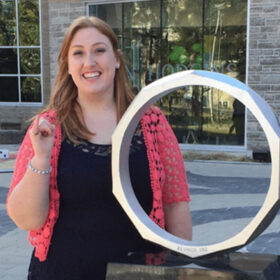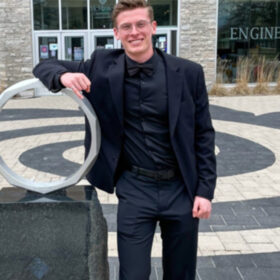
We connected with recent alumnus, Eric Greiss (Electrical Engineering & Society ’22) to talk about his experience in the Engineering & Society program. During Eric’s time at McMaster, he participated in the McMaster Baja Racing team where he worked as a Suspension Captain, Senior Technical Advisor, and the Team Manager in his final year of undergraduate study.
Even though Eric just started his career in the industry, he had wonderful things to say about his current position at Eaton working as a member of the Leadership Development Program, which he began in September of 2022. He spoke about the Engineering & Society program and how it has prepared him for his current role at Eaton.
What led you to your current position?
Eric is currently in Eaton’s two-year-long leadership program. The program consists of three 8-month-long rotations in three different departments, and they put an emphasis on hands-on learning through travelling to different facilities in Canada.
“The leadership program at Eaton takes three applicants a year, so I was fortunate enough to be one of them. Eaton provides employees in the leadership program with opportunities to lead and is a high-value program setting employees up to be future leaders of the company.”
Eric has just completed his first 8-month rotation in the engineering department in product development. He is currently in his second rotation in the commercial operations department and is working on training all of Canada alongside his team on a new software tool coming out internally to distributors.
“The new tool makes information easier to be seen and readily available, which is huge nowadays. You want to do everything fast. It will be a big challenge for me, I’m super excited to run all the training sessions and leverage the experience from society courses to apply it directly to my job.”
What Initially lead you to choose a program like Engineering & Society?
“I am not the kind of person who just wants to stay in their engineering niche my whole life. I noticed I was more social than most engineers in my program and throughout my life as I played a lot of team sports.”
“Cameron Churchill and other instructors who gave presentations at information nights showed me the value in taking the extra year and in all honesty, the Society courses were my favourite out of all courses. They had the most interesting content and the best professors who cared about their students.”
Eric mentioned instructors that helped make his time enjoyable within the program.
“I did a second-year course with Brian Bates, the first Engineering & Society course I took, and it was about building sustainable communities, which I enjoyed because of the prof, and I was extremely interested in the course content.”
“3Z03 (Preventive Engineering: Environmental Perspectives) with Greg Zilberbrant was one of my favourite classes. Visiting the different industries and learning about what they do and how they function was amazing.”
Why take the extra year?
“I was not in a rush to graduate. I felt like I could spread out my courses, in doing this I was able to absorb my engineering courses better and wasn’t just focusing on the technical aspect of my degree.”
How have Engineering & Society courses helped you in your current role?
Throughout his journey in Engineering & Society, Eric concentrated on building his soft skills within the program.
“Presentation skills, team dynamics, and communication skills are not something that is focused on in your regular engineering courses. I was able to build these skills because of my society-specific courses.”
“I have this toolbox of knowledge coming out of engineering, but if I can’t take this knowledge and explain it and use these tools to help others who aren’t in engineering, or in my life, then this toolbox is useless, and I can just throw it out because I can’t communicate it properly. I wanted to be able to gain communication skills which I believe added a lot of value for me in my career and life.”
Eric applied the skills gained in Engineering & Society courses to the McMaster Baja racing team.
“Over the course of my student career at McMaster, I was able to grow into two leadership positions within the McMaster Baja racing team.”
“In both roles, I ran meetings and in my final position, I was team manager. It was me and the team captain running a team of 80-plus people. So having communication skills and being comfortable talking in front of people was huge. The combination of that experience from society courses and the McMaster Baja racing team allowed me to secure a career at Eaton.”
What are you most proud of from your school experience?
Eric reminisced on his group capstone project which involved a proposal to the Canadian government to mandate the reuse and recycling of batteries in electric vehicles.
“There are really no government mandates in place to reuse or recycle these batteries, but these batteries still have 80% capacity once they are removed from the car!”
“They can be used in solar farms to store energy, in a household as a backup power source, and can be used in so many different industries aside from a car. We investigated the logistics, legality, and feasibility of implementing a mandate, like whether to put the ownness on car manufacturers or the government.”
“It was an interesting project and is one I am most proud of. It kind of led me to Eaton in a way because we deal with electric vehicle charging and electrical infrastructure, which is a huge part of the electricity industry. So, this capstone sparked my interest, you could say.”
Why do you think students in engineering should consider Engineering & Society?
“I think everyone should take society if they are in engineering. It goes back to the engineering toolbox I was talking about earlier. You build this toolbox of knowledge during your undergrad but if you can’t effectively communicate and break it down for people outside of your degree and profession then it’s useless, right? Engineering & Society helps you with this.”
What advice do you have for students looking back at your experience as a student?
Eric imparts some advice to current students in Engineering & Society.
“My advice to students is if they have other interests outside of engineering, to explore them and the Engineering & Society program lets you do that. For example, I wanted to do a minor in business, so I did. You can do it in psychology, innovation, sustainability, and more.”
“One of the regrets I had in my society courses was not participating enough in class.”
“There would be good discussions in class every day and I don’t know if it might have been my social anxiety, but I never really raised my hand to answer or participate much. I was afraid of people not accepting or valuing my opinion, and afraid of saying the wrong thing.”
“In the real world, you will have to build your confidence, speak up, and find your voice in a room full of people. The Engineering & Society program gave me a phenomenal base point for this skill and now in the development program at Eaton, I am developing these skills to further my career within the organization. I am getting better every day.”
What do you know now that you wish you knew during your time within Engineering & Society?
“Every first year is going to hear this but get involved, and it doesn’t even have to be an engineering club. For example, I was on the McMaster hockey team for a year. Get involved in something where you can meet people, interact with them, build relationships, and network with people inside and outside of the Engineering Faculty. That’s what it was all about for me, building valuable and interesting relationships with people.”
“If you want to learn more about a club, topic, or course, just ask! Whether that is sending a well-written email or working up the courage to approach someone in person, if your approach them in the correct way, 9 out of 10 times they’re going to want to help you and you are going to come out of the conversation with value.”

